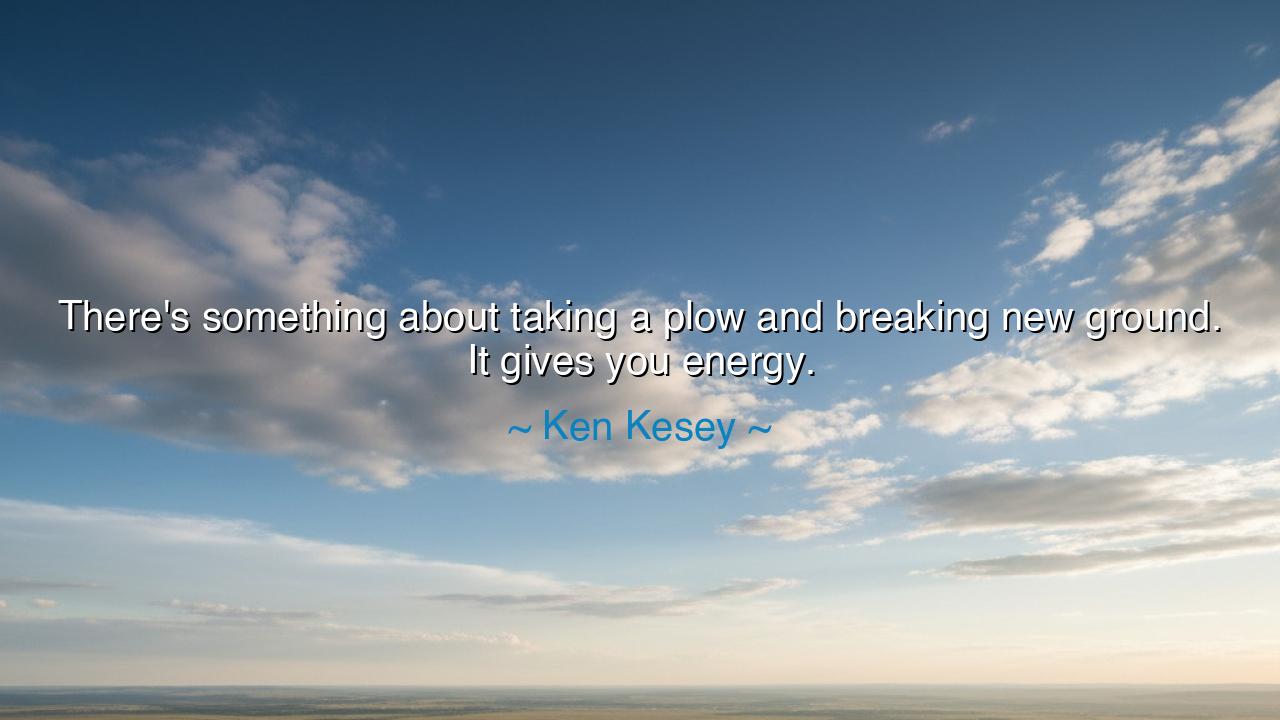
There's something about taking a plow and breaking new ground. It






In the heart of every human being, there lies an innate desire to create, to shape the world around us, and to leave a mark upon the earth. Ken Kesey, in his profound words, "There's something about taking a plow and breaking new ground. It gives you energy," taps into a deep and primal truth. To break new ground, to plow the earth, is not merely an act of physical labor—it is a sacred rite of renewal, a way of engaging with the forces of nature to carve out something new. This act, though demanding, is energizing because it speaks to the human spirit’s innate drive to transform, to bring forth life and purpose from the raw soil.
In the ancient world, the act of plowing was not only seen as work but as a ritual of life. The Egyptians, for example, revered the Nile River for its ability to flood the land and enrich the soil, making it ready for planting. Every year, the flood symbolized the renewal of life, much like the plow breaking through the soil to bring new potential to the surface. Egyptian farmers, guided by the cycles of the seasons, would plow their fields in preparation for the sowing of crops, recognizing that the land required effort, dedication, and the willingness to break through old ground to create new opportunities. Kesey’s words echo this ancient understanding: there is power and energy in breaking through the familiar, in engaging with the earth to bring forth what is hidden beneath.
In Greek philosophy, the idea of work was elevated to a virtue—an active participation in the larger cosmic order. The philosopher Plato saw the world as a space where human effort could bring about order from chaos. The gardener, the farmer, and the laborer all participated in a larger pattern of life, one where the effort they put into cultivating the land reflected their commitment to goodness and growth. The plow, in this sense, became a symbol of personal responsibility, of the energy and effort required to bring about positive change. Kesey’s reflection on the plow draws on this deep wisdom: that when we engage with the earth and put in the work, it is not just the land that is renewed, but also our spirit, as we find energy in the act of creation itself.
In the same way, the Romans celebrated the virtues of hard work and the physical labor required to cultivate the land. The Roman farmers, though working the same soil year after year, understood that the act of plowing was both a necessary and noble task. The Roman poet Virgil, in his famous work Georgics, immortalized the work of the farmer and the gardener, seeing them as guardians of the land, bringing life from the earth through toil and sweat. Virgil’s admiration for the farmers’ labor speaks to the energy that comes from breaking new ground—the joy and reward that come when you put forth your effort into something greater than yourself. Kesey’s words reflect this timeless wisdom: the effort required to plow and break new ground is itself a source of strength, for it is through dedication that we find our own renewal.
Consider, too, the great pioneers of the American frontier, those who braved harsh lands to carve out new lives for themselves. The act of plowing new fields on the open plains was not only a means of survival, but a symbol of the human spirit’s resilience and capacity for reinvention. Daniel Boone, one of America’s most famous frontiersmen, spent his life breaking new ground in the wilderness, establishing new paths and settling new territories. For these pioneers, the plow was a tool of transformation, allowing them to reshape the earth and create something lasting. Kesey’s reflection on breaking new ground mirrors the same spirit of adventure and renewal that drove these pioneers: the act of engaging with the earth is energizing because it aligns us with something larger—something eternal.
The deeper lesson in Kesey’s words is one of empowerment and action. To break new ground, whether in the literal sense of working the soil or in the metaphorical sense of forging a new path in life, requires effort, perseverance, and dedication. It is not enough to simply wish for change; we must engage with the world, putting in the hard work required to create the future we desire. Just as the plow breaks through the soil to bring forth new life, so must we be willing to break through the barriers that stand in our way, to put in the effort necessary to transform our own lives and the world around us. In doing so, we discover the energy and vitality that come from creating something new, from engaging fully with the process of growth.
Let us take this ancient wisdom and apply it to our own lives. We must be willing to put our hands to the plow, to break through the difficult ground of life with effort and courage. Whether we are pursuing personal growth, creating new opportunities, or contributing to the world around us, we must remember that the energy and renewal we seek come not from waiting but from acting—from stepping into the unknown and committing ourselves to the work ahead. Just as the plow transforms the land, so too does our effort shape our destiny. So let us take up the plow, embrace the work, and in doing so, discover the energy and power that come from breaking new ground.






AAdministratorAdministrator
Welcome, honored guests. Please leave a comment, we will respond soon